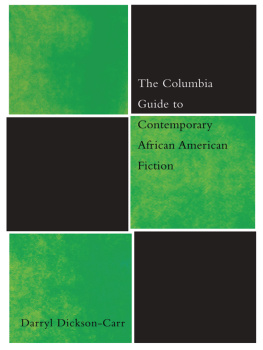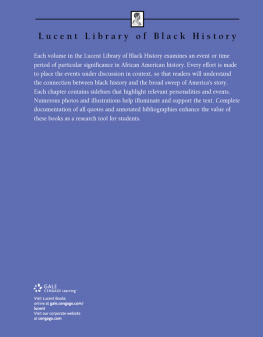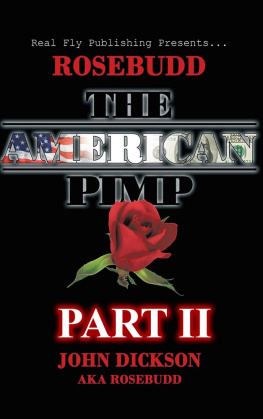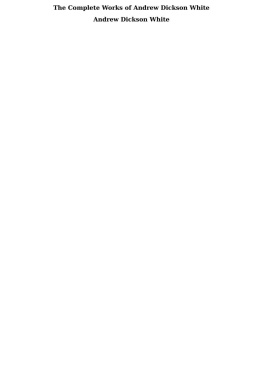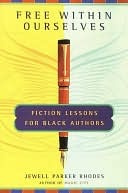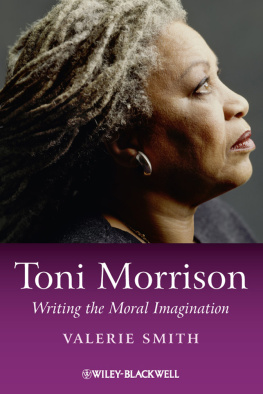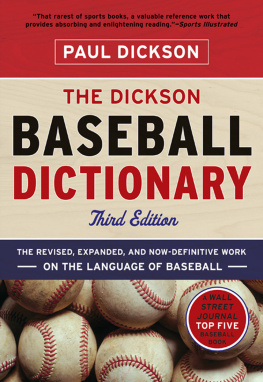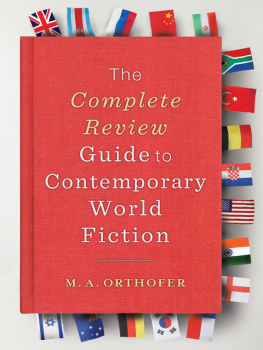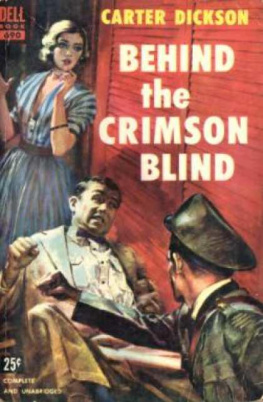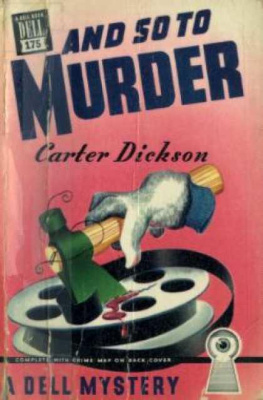The Columbia Guide to Contemporary African American Fiction
Columbia Guides to Literature Since 1945
The Columbia Guides to Literature Since 1945
The Columbia Guide to the Literatures of Eastern Europe Since 1945, ed.
Harold B. Segel
The Columbia Guide to Contemporary African American Fiction
Darryl Dickson-Carr

Columbia University Press
New York
Columbia University Press
Publishers Since 1893
New York Chichester, West Sussex
cup.columbia.edu
Copyright 2005 Columbia University Press
All rights reserved
E-ISBN 978-0-231-51069-1
The index of this book was made possible by a Research and Creative Activity grant from the Department of English at the Florida State University.
Library of Congress Cataloging-in-Publication Data
Dickson-Carr, Darryl, 1968
The Columbia guide to contemporary African American fiction / Darryl Dickson-Carr.
p. cm. (Columbia guides to literature since 1945)
Includes bibliographical references and index.
ISBN 0231124724 (cloth : alk. paper)
1. American fictionAfrican American authorsHistory and criticismHandbooks, manuals, etc. 2. American fiction20th centuryHistory and criticismHandbooks, manuals, etc. 3. African AmericansIntellectual life20th centuryHandbooks, manuals, etc. 4. African Americans in literatureHandbooks, manuals, etc. I. Dickson-Carr, Darryl, 1968 II. Title. III. Series.
PS374.N4D533 2005
813.540986073dc22
2005045454
A Columbia University Press E-book.
CUP would be pleased to hear about your reading experience with this e-book at .
For Carol
Contents
The primary goal of this guide is to introduce the reader to the literature, careers, and critical issues surrounding major African American fiction authors published since 1970. This period witnessed an explosion of literary talent from American authors of African descent. As hundreds of these authors made an impressive and permanent mark upon the publishing world, they enjoyed an unprecedented level of attention from academics and critics alike. As a group, these authors clearly owe great debts to previous literary movements, but they have also carved out their own distinctive niches that have irreversibly transformed the landscape of African American literature and its reception in both American publishing and the academy. The reader will be able to trace, whether by randomly sampling this guides 164 entries or by reading it in its entirety from start to finish, how African American fiction became a centerpiece of American literary history at the end of the twentieth century even as it remained the site of celebration, contestation, diversity, and no small amount of controversy.
Each period within the history of African American literature contains its own loosely definable agenda. Most African American authors have sought to provide at least a glimpse into the varied experiences of African Americans and how those experiences, ranging from the joyous and celebratory to the cataclysmic and horrific, have forced America to transform itself into a nation that better reflects the promises and ideals of democracy. My ultimate goal is to demonstrate how the most recent wave of African American fiction and, to a slightly lesser extent, its criticism best reflect this often-tortured, yet endlessly fascinating transformation.
This guide reviews authors, movements, institutions, and publications that emerged between 1970 and 2000. I begin at 1970 primarily because that year was the crux of a number of major shifts in African American politics. The philosophy of integration and pacifism that Martin Luther King Jr. and the Southern Christian Leadership Conference represented were slowly but inexorably supplanted by African American cultural nationalism beginning in the mid-1960s, inaugurating what is now known as the postCivil Rights era, which extends until the present. The era that most Americans consider the apex of Civil Rights activism began with the 1954 Brown v. Board of Education of Topeka, Kansas Supreme Court decision and ended with the assassination of King, although the fight for Civil Rights truly began many decades earlier, arguably at the end of legal chattel slavery in 1865. The modern push for equality, however, in which King participated and for which he has become a popular icon, arguably began with the Brown decision and had its first major victory in the Montgomery, Alabama, bus boycott of 1955. Kings assassination in 1968 meant that one of the most important eras in American historyrivaled only by the Revolutionary and Civil wars and the decades leading to themlost a crucial leader, one who stood on the side of hope and peace. The vacuum he left was filled with many voices questioning the efficacy of the strategy and practice of the nonviolent direct action that defined the modern Civil Rights movement. Among these voices were many African American intellectuals and writers who constituted the Black Arts Movement.
In African American literary arts, the radicalism of the Black Arts Movement advocated by such luminary writers and critics as Imamu Amiri Baraka (n LeRoi Jones), Hoyt Fuller, Addison Gayle, Nikki Giovanni, Sonia Sanchez, Carolyn Rodgers, Maulana Ron Karenga, and Gwendolyn Brooks brought about a sea change in the literatures scope and content. As we shall see below, debates regarding the merits of pursuing art for arts (or the artists) sake versus creating socially conscious art have raged for over a century among African American intellectuals. By the late 1960s, though, the latter position of the debate was ascendant as black politics became radicalized in the wake of racisms continuing entrenchment, the demise of African colonialism, and the deaths of such leaders as Malcolm X and Medgar Evers. Literature with a more proletarian or grassroots orientation became popular, as did a sort of radical chic. This did not mean that careful artistic craft was in abeyance, but it did mean that someone interested in African American literature in 1970 would have found very little being published that resembled what Richard Wright called, in his famous criticism of the Harlem Renaissance, humble novels, poems, and plays, prim and decorous ambassadors who went a-begging to white America. Instead, many of African American literatures most prominent artists openly advocated various forms of revolution, from armed conflict to the ideological transformations of cultural nationalism.
Most obviously, 1970 also marked the end of the 1960s, in which the ideological foundations for most of the literature to follow were laid. In 1970 alone, many landmark novels, fiction anthologies, and bibliographies emerged from the writers and editors whose work has attracted extensive critical and popular interest: Ishmael Reed (19 Necromancers from Now), Alice Walker (The Third Life of Grange Copeland), Toni Morrison (The Bluest Eye), Darwin Turner (Afro-American Writers). The years immediately following witnessed the publication of many texts that have since ascended to the current African American literary canon: The Black Aesthetic, by Addison Gayle (1971); Ishmael Reeds Mumbo Jumbo (1972); Charles Johnsons Faith and the Good Thing (1974); Toni Morrisons Sula (1974), and so on. In short, 1970 marked the beginning of a contemporary flourish that has never truly subsided.
Critical and scholarly attention to African American authors has grown in the last three decades to the point that it is now virtually unthinkable for major literary journals specializing in American literature to ignore black authors. Most critical appraisals and analyses of these authors are now sympathetic, due in large part to the infusion of African American scholars into academia. Regardless of levels of sympathy, the theories of such African American scholars as W. E. B. Du Bois, Toni Morrison, Henry Louis Gates Jr., Barbara Smith, Hortense Spillers, Houston A. Baker Jr., Arnold Rampersad, Audre Lorde, Alice Walker, and Wahneema Lubiano frequently inform most critiques of African American literature. Hundreds of monographs, essay collections, and individual book chapters have been devoted to African American authors since 1970, and since 1996, several major anthologies and critical companions and guides have been published to provide the beginning student of African American literature with quick and easy access to the primary and secondary material in the field. This
Next page
